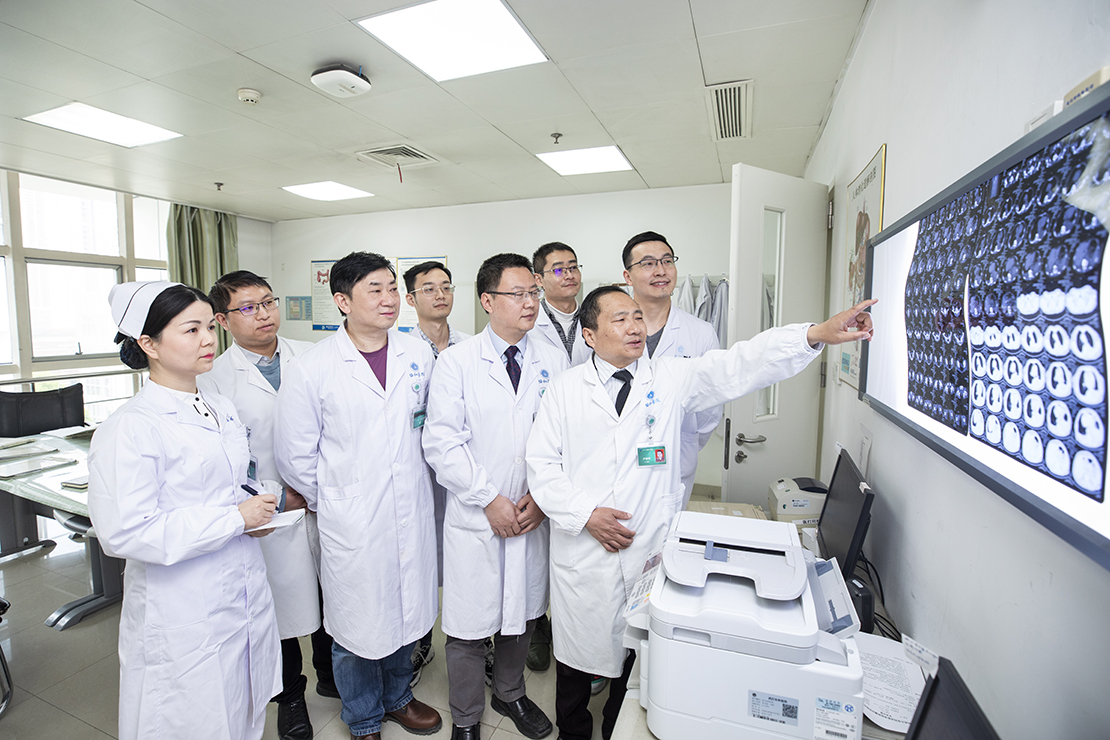Medical Services

Digestive Oncology Surgery Dept.
Brief introduction
The Department of Digestive Oncology Surgery is coordinated and established by the department of general surgery of Union Hospital, which is the one of the well-known national key disciplines. Its medical team is composed of surgical oncology experts who have experiences of study abroad. It integrates top-notch professional backbone talents in digestive oncology surgery, excellent nursing team and perfect medical facilities. There are 12 doctors and 26 nurses in the department, including 2 chief physician and professors and1 associate chief physician. There are 71 open beds in the department. There are 1500 patients admitted annually, and more than 1200 operations per year, including 500 for gastric cancer, 500 for colorectal cancer and 200 for biliary and pancreatic cancer.
Clinical treatment:
This discipline is at the advanced level in China and the leading level in the Hubei province in the field of gastrointestinal surgery. The digestive oncology surgical team was the first to carry out completely laparoscopic gastrointestinal tumor surgery in the Hubei province, in pursuit of achieving the best treatment effect with the least trauma. The medical team persists in promoting standardized treatment of digestive system diseases in Hubei province and China, and summarizes a set of reasonable and efficient comprehensive treatment plan. The main diagnosis and treatment of diseases include gastrointestinal cancer, stromal tumor, pancreatic tumor, liver tumor, bile duct tumor, small intestine and appendix tumor, large retroperitoneal tumor, intestinal leakage (fistula) etc.
Specialty Features:
1. Standardized treatment of gastric cancer and colorectal cancer
The department carries out standardized radical surgery for gastric cancer, colon cancer and rectal cancer. It is the first to carry out laparoscopic gastrointestinal tumor surgery in central China, while taking into account the minimally invasive and radical operation. At present, more than 90% of operations in the department are minimally invasive laparoscopic surgery. In recent years, the incidence of proximal gastric cancer that invaded the esophagus has increased significantly. The department has carried out laparoscopic radical gastrectomy through the diaphragmatic hiatus to avoid the trauma caused by thoracotomy. Large intestinal tumors were excised in vitro and small intestinal autotransplantation was performed to solve the surgical problem of unresectable large mesenteric tumors. Laparoscopic rectal cancer ultra-low anal preservation surgery, properly retain the patient's anal function, urination function and sexual function, so that the quality of life of rectal cancer patients significantly improved.
2. Standardized treatment of pancreatic tumors and hepatobiliary tumors
The hepatobiliary and pancreatic cancer team focuses on the diagnosis and treatment of pancreatic cancer, ampullary cancer, hilar cholangiocarcinoma, liver cancer and other tumors. They give full play to the advantages of multidisciplinary diagnosis and treatment in the cancer center to carry out surgical treatment for patients with liver metastases from colon cancer, including resection of primary colon tumor, resection of liver metastases or radiofrequency ablation. In addition, for patients with inoperable biliary pancreatic tumors, minimally invasive surgery of endoscopic stent implantation can be carried out to improve the quality of life of patients and create treatment conditions for subsequent medical treatment.
3. Comprehensive treatment of intestinal fistula
Gastrointestinal fistula after gastrointestinal tumor surgery, especially high intestinal fistula and multiple complex intestinal fistulas, has always been the difficult treatment in the field of gastrointestinal surgery. The departmentearly startedtouse parenteral and enteral nutrition combination and adequate drainage to treat intestinal fistula. In recent years, along with the application of colostomy nursing technique to patients with intestinal fistula, the patient's quality of life has greatly improved.
4. Perfusion therapy for peritoneal cancer
The department has the most advanced intraperitoneal hyperthermic perfusion chemotherapy technology in China. It has unique and safe curative effect for peritoneal metastasis of gastric cancer, colorectal cancer, ovarian cancer, peritoneal pseudomyxoma, malignant peritoneal mesothelioma, hepatobiliary pancreatic malignant tumor and other abdominal malignant tumors and their concurrent malignant ascites. It can significantly prolong the survival time of patients with such advanced tumors and improve their quality of life.
Scientific research:
The department is mainly engaged in the research on the pathogenesis, development and drug resistance of digestive tumors, as well as the mechanism and clinical application of small intestinal transplantation. The members of the department have presided over and participated in a number of national natural science fund and provincial natural science fund research projects. Experts of the whole department have published more than 80 papers in international and domestic authoritative journals, including more than 50 papers in SCI.
Talent cultivation:
So far, the department has established long-term cooperative relations with international famous medical research institutions. In the past few years, the department has trained dozens of master’s students, dozens of doctoral students, and nearly 100 doctors in clinical guidance.




